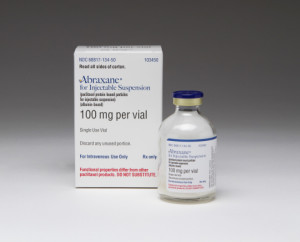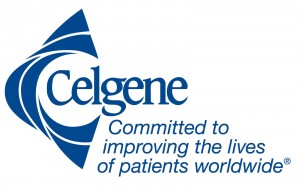Abraxane now part of standard-of-care for patients with advanced pancreatic cancer, following studies at the Virginia G. Piper Cancer Center at Scottsdale Healthcare
SCOTTSDALE, Ariz. — Sept. 6, 2013 — The U.S. Food and Drug Administration today approved Abraxane for patients with advanced pancreatic cancer, following 7 years of rigorous clinical trials overseen by Scottsdale Healthcare and the Translational Genomics Research Institute (TGen).

Abraxane, the brand name for nab-paclitaxel, was approved for use in combination with gemcitabine, the previous standard drug therapy, following a large scale international clinical trial headed by Dr. Daniel D. Von Hoff, TGen Physician-in-Chief and Chief Scientific Officer at Scottsdale Healthcare’s Virginia G. Piper Cancer Center Clinical Trials, a partnership of Scottsdale Healthcare and TGen.
“This is a new standard for treatment of metastatic pancreatic cancer that could become the backbone for other new treatment regimens,” said Dr. Von Hoff, echoing the analysis he presented earlier this year at the annual meeting of the American Society of Clinical Oncology (ASCO). “The fact that Abraxane plus gemcitabine demonstrated an overall survival benefit is a significant step forward in offering new hope for our patients.”
Dr. Von Hoff was the Principal Investigator of MPACT (Metastatic Pancreatic Adenocarcinoma Clinical Trial), the Phase III clinical study of 861 cancer patients at 121 sites in North America, Europe and Australia.
The study found that the combination of Abraxane and gemcitabine extended median overall survival by nearly 2 months, compared to gemcitabine alone — extending median survival to 8.5 months, from 6.7 months. The one-year median survival of patients increased to 35 percent, from 22 percent.
“Although a two month increase in median survival may not seem like much, it is a critical milestone and, even more important is the significantly improved odds for patients surviving at least one and two years. Previously very few survived one year and now we are seeing a meaningful chance of surviving one and two years. This brings real hope for even better outcomes in the future for this terrible disease,” said Dr. Mark Slater, vice president of Research and chief executive of the Scottsdale Healthcare Research Institute.
“This is a great example of Scottsdale Healthcare Research Institute’s collaborative approach of having leading researchers, community physicians and clinical teams working together to develop new therapies and innovative treatments that benefit patients here in Arizona and across the United States,” added Ron Korn, M.D., medical director of the Virginia G. Piper Cancer Center at Scottsdale Healthcare.
Pancreatic cancer is the nation’s fourth leading cause of cancer-related death, responsible this year for an estimated 45,000 new cases, and more than 38,000 deaths. There is no method of early detection, so pancreatic cancer patients often are not diagnosed until their cancer is in its advanced stages. Nearly 75 percent die within the first year of diagnosis, and fewer than 6 percent survive more than 5 years.
“Pancreatic cancer incidence is increasing worldwide, and we are optimistic that this will have an impact for treating advanced pancreatic cancer,” added Ramesh Ramanathan, M.D., medical director of Virginia G. Cancer Center Clinical Trials at Scottsdale Healthcare and MPACT principal investigator for the United States.
Today’s approval of Abraxane by the FDA as a front-line treatment of pancreatic cancer follows years of clinical trials, including those managed by Translational Drug Development (TD2), the pharmaceutical-development subsidiary of TGen.
“We are proud to have helped navigate the regulatory requirements and study protocols that helped ensure that Abraxane was not only effective, but also safe for patients with advanced pancreatic cancer,” said Dr. Stephen Gately, President and CEO of TD2. “This is one of the most significant advancement in the treatment of pancreatic cancer since the FDA approved gemcitabine in 1996.”
Dr. Von Hoff, considered among the nation’s leading authorities on pancreatic cancer, also was the principal investigator for the first clinical trial of gemcitabine, the first therapy to show improvement in survival for patients with pancreatic cancer.
The pancreas is a glandular organ behind the stomach that secretes enzymes to help digestion, and produces hormones, including insulin, which helps regulate blood-sugar metabolism.
Abraxane wraps traditional chemotherapy, paclitaxel, in near-nano sized shells of albumin, a protein that the tumor recognizes as food. Once inside the tumor, the Abraxane acts like a “Trojan Horse” to release chemotherapy and kill the cancer cells.
Abraxane, made by Celgene Corporation, previously was approved by the FDA for use in the treatment of metastatic breast cancer and advanced lung cancer.
# # #
About the Virginia G. Piper Cancer Center at Scottsdale Healthcare
The Virginia G. Piper Cancer Center at Scottsdale Healthcare in Scottsdale, Ariz. offers comprehensive cancer treatment and research through clinical trials, diagnosis, treatment, prevention and support services in collaboration with leading scientific researchers and community oncologists. Scottsdale Healthcare is the nonprofit parent organization of the Virginia G. Piper Cancer Center at Scottsdale Healthcare, Scottsdale Healthcare Research Institute, Scottsdale Healthcare Osborn Medical Center, Scottsdale Healthcare Shea Medical Center and Scottsdale Healthcare Thompson Peak Hospital. For more information, visit www.shc.org.
Press Contact:
Jamie Grim
Virginia G. Piper Cancer Center at Scottsdale Healthcare
480-323-1387
jgrim@shc.org
*
About TGen
Translational Genomics Research Institute (TGen) is a Phoenix, Arizona-based non-profit organization dedicated to conducting groundbreaking research with life changing results. TGen is focused on helping patients with cancer, neurological disorders and diabetes, through cutting edge translational research (the process of rapidly moving research towards patient benefit). TGen physicians and scientists work to unravel the genetic components of both common and rare complex diseases in adults and children. Working with collaborators in the scientific and medical communities literally worldwide, TGen makes a substantial contribution to help our patients through efficiency and effectiveness of the translational process. For more information, visit: www.tgen.org.
Press Contact:
Steve Yozwiak
TGen Senior Science Writer
602-343-8704
syozwiak@tgen.org
*
About Translational Drug Development (TD2)
Translational Drug Development (TD2) is an oncology drug development organization and is wholly owned by the Translational Genomics Research Institute (TGen). TD2 provides innovative services for oncology focused biopharmaceutical companies using a dedicated team of professionals with broad experience and understanding in drug development. TD2 is uniquely positioned to support the need for improved and accelerated development of new chemical entities (NCE’s) for life-threatening diseases. TD2 uses a unique combination of experience gained through its contract research organization business, and an integrated suite of proprietary and non-proprietary tools, preclinical study execution, regulatory affairs assistance, clinical trial design and management, and drug development experts to successfully move therapeutics towards regulatory approval. TD2 is dedicated to reducing the risks and uncertainty inherent in the drug development process. For more information about Translational Drug Development, visit www.td2inc.com.
Press Contact:
Tara Franks
VP, Business Operations
602-358-8322
tfranks@td2inc.com
*
About Celgene
Celgene Corporation, headquartered in Summit, New Jersey, is an integrated global pharmaceutical company engaged primarily in the discovery, development and commercialization of innovative therapies for the treatment of cancer and inflammatory diseases through gene and protein regulation. For more information, please visit www.celgene.com.



